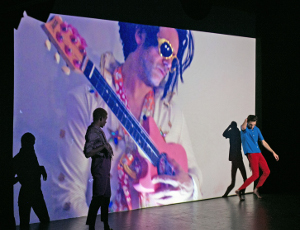On a radiantly beautiful Sunday afternoon, Rodney Wynkoop led members of two chamber choirs — the Chamber Choir of the Choral Society of Durham and the Chamber Choir of the Duke University Chorale, the university’s “elite” vocal ensemble — in two works by Arvo Pärt (b.1935) and works by two Bachs — Johann Christian and his father, “Old” Bach (aka Johann Sebastian). Although presented in Duke Chapel, the concert itself was chamber-sized, and intimate as well. Two of the works were Magnificats; they were sung without pause between them, and both were short. The accompanists included some of our region’s finest instrumentalists, members (or former members) of the NC Symphony and other distinguished ensembles, of course, but also teachers, scholars, and early music specialists. No one can make music sound better in the Chapel than Maestro Wynkoop, so those who may have lamented the venue — so lovely to look at — need not have been apprehensive. In fact, the program was for the most part slowly paced and somber (or, if you prefer, reflective), and there was complex polyphony only in parts of the works by the two Bachs, so there were few sections where reverb got the upper hand to cloud the sound. The combination of two chamber choirs might be seen as resulting in one standard-sized ensemble, but two were in fact needed in the concert opener, J.C. Bach’s Magnificat, for double choir, and indeed one might have wanted even a few more tenors than were on hand in the closing work, J.S. Bach’s Cantata 150, where once or twice the high male voices sounded a mite scrawny. Still it was such an exceptional program, so extraordinarily well sung, that no one can have been disappointed. And although the concert lasted just an hour, there was so much intensity and so much intense listening that one could hardly have wanted even one short number more than was offered.
As noted, things got underway with J.C. Bach’s brief, somewhat extroverted Magnificat. It was followed immediately by Pärt’s 1989 setting of the same text. The latter composer’s music, splendidly described in program notes by Susan Dakin, seems at once ethereal, other-worldly, and timeless, so it was something of a shock to realize that it took him only a few more minutes to traverse the same words than it had taken J.C.B. some 231 years earlier. There were several worlds’ difference in the style, of course, but the juxtaposition was breathtaking — it was yet another example of Wynkoop’s brilliance as a program-maker, quite aside from his skill in building and leading choirs.
Pärt’s eight-part Berlin Mass was composed a year after the Magnificat. It is unusual in that it contains several sections not generally encountered in everyday masses: there are two brief Allelulias for Pentecost, each with chant-like inner sections, followed by a summoning of the Holy Spirit (“Veni Sancte Spiritus”) that, perhaps more than any other single part of the whole program, sounded like it was coming from nowhere and everywhere all at once. (If you think there’s a heaven up there, chances are good it might sound like this.)
The aforementioned intensity that was a hallmark of this concert reached its peak in the Berlin Mass, which lasted around 21 or 22 minutes. If there had been nothing else on the program, it would have been enough to engulf the substantial crowd in soul-searching reflection. But Wynkoop ended with an ultimately reaffirming early cantata by J.S. Bach that starts out in an atypically somber fashion. The accomplished soprano soloist was Kirsten Blackman of the Choral Society. The trio in the fifth section, to the wonderful words (as translated), “Cedars must, before the winds, often feel much hardship…,” was sung by CSD members Kathy Lee, Andy Stewart, and Eric Campbell. At the end, the applause was somewhat subdued. How demonstrative can one be, after an extraordinary program like that? Those who felt richly blessed and said so, in their own ways, did enough.
Note: Although it didn’t say so in the program, it was noted in pre-performance publicity that “Arvo Pärt is dedicating all performances of his music during 2006-07 to the memory of the slain Russian journalist Anna Politkovskaya.”











